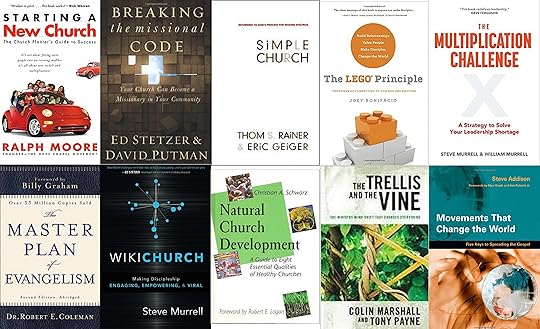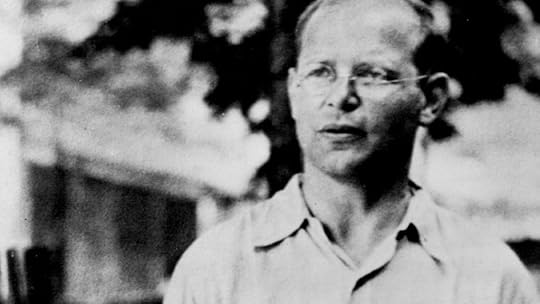Steve Murrell's Blog, page 54
October 26, 2016
Top 10 Books for Church Planters
MANILA, PHILIPPINES. I recently received an email from a pastor and friend of mine who asked me to recommend some books on church-planting. Here’s the list I sent him, in no particular order.
1. Starting a New Church by Ralph Moore (2002). Church-planting wisdom from one of the most prolific church planters of my generation.
2. Breaking the Missional Code by Ed Stetzer & David Putnam (2006). Thoughts on how to apply the missionary mind-set to church planting.
3. The Master Plan of Evangelism by Robert Coleman (1963). The classic work on making disciples.
4. WikiChurch by Steve Murrell (2011). The story of Victory Manila and the case for the four E’s of discipleship.
5. The Lego Principle by Joey Bonifacio (2012). A book on the importance of connecting to God and connecting to others.
6. Simple Church by Thom Rainer & Eric Geiger (2006). The best practical how-to book on doing church.
7. Natural Church Development by Christian Schwarz (1996). A helpful check-list of “eight essential qualities of healthy churches.”
8. The Trellis and the Vine by A.S. Payne & Colin Marshall (2009). A biblical way of thinking about structure and systems.
9. The Multiplication Challenge by Steve Murrell (2016). A strategy to solve your leadership shortage.
10. Movements that Change the World by Steve Anderson (2011). A book that will remind church planters to focus on the big picture.
Whether you’re a young pastor planting your first church or you’re an experienced church planter who has planted many churches, I can’t stress enough the importance of reading. You will never outgrow the need to learn more; and you will probably never make it through all the good books on the topic of church planting.
If you invest the time (and money) into books like these, you will see an exponential return in your life and in the life of your church.
My Top 10 Books for Church Planters
MANILA, PHILIPPINES. I recently received an email from a pastor and friend of mine who asked me to recommend some books on church-planting. Here’s the list I sent him, in no particular order.
1. Starting a New Church by Ralph Moore (2002). Church-planting wisdom from one of the most prolific church planters of my generation.
2. Breaking the Missional Code by Ed Stetzer & David Putnam (2006). Thoughts on how to apply the missionary mind-set to church planting.
3. The Master Plan of Evangelism by Robert Coleman (1963). The classic work on making disciples.
4. WikiChurch by Steve Murrell (2011). The story of Victory Manila and the case for the four E’s of discipleship.
5. The Lego Principle by Joey Bonifacio (2012). A book on the importance of connecting to God and connecting to others.
6. Simple Church by Thom Rainer & Eric Geiger (2006). The best practical how-to book on doing church.
7. Natural Church Development by Christian Schwarz (1996). A helpful check-list of “eight essential qualities of healthy churches.”
8. The Trellis and the Vine by A.S. Payne & Colin Marshall (2009). A biblical way of thinking about structure and systems.
9. The Multiplication Challenge by Steve Murrell (2016). A strategy to solve your leadership shortage.
10. Movements that Change the World by Steve Anderson (2011). A book that will remind church planters to focus on the big picture.
Whether you’re a young pastor planting your first church or you’re an experienced church planter who has planted many churches, I can’t stress enough the importance of reading. You will never outgrow the need to learn more; and you will probably never make it through all the good books on the topic of church planting.
If you invest the time (and money) into books like these, you will see an exponential return in your life and in the life of your church.
October 18, 2016
Post-Conference Thoughts: Back to Work
NASHVILLE, TENNESSEE, USA. Deborah and I just got back to Nashville from Cape Town, South Africa, where we attended the Every Nation World Conference with thousands of delegates from fifty-eight nations. For those of you who couldn’t make it, check out the recap video(s) and mark your calendars for the next world conference—coming in 2019.
I often find that when I return home from a conference, I’m re-energized to pursue God’s mission for my life and my church, but sometimes I don’t know where to start. There are so many new ideas running through my head and so many pages of notes to sift through. How can I begin to implement the global vision and mission in my local context? And how can I convey the big picture to staff and leaders in my local church who weren’t at the conference?
As leaders, sometimes it can be difficult to translate the momentum of a world conference into concrete action in your local church context.
My advice: keep things simple. Channel all of your energy and momentum into building strong and healthy local churches and campus ministries. Building a strong, healthy church and campus ministry is not complicated. Difficult—yes. Complicated—no. The starting point for a leader is to focus on the few things that really matter: discipleship, worship, and leadership.
Strong, healthy churches and campus ministries must be great in these three areas:
1. Discipleship. As I’ve said many times before, God calls us to make disciples. When we do that, He will build His church. To assess how you’re doing in this area, ask yourself these four questions: Are we actively engaging our culture and community? Are we consistently establishing biblical foundations—in both new believers and old-timers? Are we effectively equipping every member to be a minister of the Gospel? Are we empowering disciples to make disciples?
2. Worship. Though I haven’t written this book (yet), you might say that there are 4 S’s to worship—singing, sermons, service, and sacrament. To assess how your church is doing in this area, ask yourself these four questions: Do the songs we sing together as a church point us to Jesus and motivate us for mission? Are the sermons we preach theologically sound, culturally relevant, and Christ-centered? Does our “spiritual worship” (see Romans 12:1) include service outside the church walls? Does our worship prioritize and celebrate the sacraments of communion and baptism—or have they become empty rituals?
3. Leadership. As I’ve written recently, leadership development is crucial whether your church or campus ministry is small or large, growing or stagnant, new or old. To assess how your church or campus ministry is doing in this area, ask yourself these four questions: Are we actively identifying emerging leaders? Are we providing opportunities for instruction so that our emerging leaders can grow? Are we creating time for impartation so that we can pass on to future leaders the vision, values, and mission of our church? Are we making opportunities for internships so that emerging leaders can work alongside and learn from established leaders?
Allow these questions to help you focus your energy and post-conference momentum on the things that really matter.
October 4, 2016
Why GO?
CAPE TOWN, SOUTH AFRICA. Yesterday was the official start of our Every Nation GO Conference in Cape Town, South Africa. Over the next few days, thousands of people will be gathering from all over the Every Nation world to worship God, to connect with spiritual family, and to remind ourselves of our mission: to make disciples of all nations.
You may be asking yourself — can’t I do all of those things from the comfort of my own home? Why take the time and money to travel half-way across the world for a conference?
Obviously, there are plenty of legitimate reason why people can’t come. But here are three reasons why I would recommend making the effort to come to conferences like these (which occur every three years):
WORSHIP: Though it’s true that you can worship God in your own local church (or anywhere for that matter), there is something powerful about worshipping God with people who don’t look like you, don’t think like you, and don’t speak (and sing) in the same language as you do. If you’ve ever been to a GO conference, you know that we make it a priority for our worship to give you a taste of the diversity of heaven — where God is being worshipped by every tribe, tongue, and nation.
FAMILY: Though you can (and should) experience Christian community in your local church setting, there is something eye-opening about connecting with spiritual family from around the world. Whether it’s hearing a testimony from a believer facing persecution in the Middle East or simply grabbing lunch with a local church member from the host country (in this case South Africa), you’ll be amazed to see that despite our many cultural differences, we share a bond of unity that transcends national, cultural, and linguistic differences.
MISSION: Though you can remind yourself of God’s mission wherever you are, throughout the Old and New Testaments, there is a distinct pattern of God calling His people to gather together to receive instructions and strategies from Him about the mission. Whether it was Moses and the Israelites meeting with God at Mount Sinai or Jesus and the disciples meeting at the Mount of Olives, God often chooses to impart mission and vision to his people when they are gathered together.
I can’t wait to see what God does in and through us in the next few days as we come into His presence and are equipped and empowered to go out into the world to make disciples.
September 26, 2016
Parenting Lessons from the World’s Busiest Father
DETROIT, MICHIGAN, USA. This weekend I was in Detroit ministering with Bishop Marvin Winans at Perfecting Church, a great church in a great city. I’ll probably write more about that in a future blog. My last blog was about parenting lessons from a funeral. This week’s blog offers tips for the ultra-busy parent.
One of the main reasons why it is often so difficult to engage our children is that intentional engagement takes time. There are no short cuts. There is no outsourcing. You can only engage your children if you spend time with them.
It’s so easy to make excuses and point to our busy schedules. You probably are busy—but probably not as busy as the President of the United States.
Here’s what he said in an essay on balancing work and family:
Even with our jam-packed days, Michelle and I work hard to carve out certain blocks of family time that are sacrosanct. For example, at 6:30 p.m., no matter how busy I am, I leave work to go upstairs and have dinner with my family. That’s inviolable. My staff knows that it pretty much takes a national emergency to keep me away from that dinner table…
So for an hour or so at dinner, my focus is not on my day, but on theirs… The highlight of my day is just listening to their thoughts about the world and seeing what smart, funny, kind young women they’ve become. That hour recharges me and gives me perspective…
And like many parents of high school juniors who are excitedly touring college campuses, I’m already dreading that empty seat at the table when Malia goes off to school next fall. I can feel myself lingering at the table a little longer, trying to stave off the passage of time. But for as long as possible, I’m going to enjoy every minute of finally having us all together under one roof.
These are the words of a father who is engaged in the lives of his two daughters.
Despite the fact that he has the busiest and most demanding schedule on the planet and despite the fact that he himself grew up without a father, President Obama has decided to prioritize time with children.
Do you?
September 19, 2016
Parenting Lessons from a Funeral

Me with the Fabregas family at the funeral
NASHVILLE , TN, USA. This past weekend Deborah, William (my oldest son), and I spoke at a parenting seminar at Bethel Brentwood. During the half-day seminar, we talked about the four Es of parenting (sound familiar?) and tackled four big questions that every parent should ask themselves:
How can we engage our children’s world?
How can we establish strong biblical foundations?
How can we equip our children for life?
How can we empower them to pursue God’s calling on their lives?
I opened the first session with a story about a good friend mine who recently passed away at the age of 77.
Salvador Fabregas was a pillar of our church for many years. He and his wife became Christians in their late 40’s. One by one his adult children came to faith, and most of his eighteen grandchildren have grown up in our church in Manila.
When we found out about his passing, I was in Nashville, so I quickly booked a flight to Manila so I could be there for the funeral.
One thing I will never forget about the funeral was hearing his grandchildren talk about their grandfather.
One grandson talked about his memories playing chess with (and always losing to) his grandfather. Another referred to his grandfather as one of his biggest fans on the soccer field. One granddaughter talked about how his grandfather was such a good listener and was always making sure he was up to date on what was going on in her life. Pretty soon a clear pattern emerged.
This grandfather was deeply engaged in the lives of his grandchildren. He didn’t necessarily care about chess or soccer or high school drama—he cared about them.
As a grandfather of two, I was blown away by the fact that my friend had eighteen grandchildren—ranging from their mid-thirties to their early teens—and every single one of them felt like he was engaged in their lives.
As parents, one of our most important jobs is to engage our children. Love what they love. Care about what they care about. Listen to what is on their minds.
It seems simple enough, but at certain stages, it can be difficult for parents to engage their children. Maybe your son’s or daughter’s interests have changed to things that you know nothing about. Maybe your teenager is intentionally pushing you away. Maybe you a have a new baby in the family that is taking a lot of your time and attention. Or maybe you are simply too busy at work.
Whatever season of parenting we find ourselves in, let’s learn from my good friend Salvador. Let’s stay engaged with our children (and eventually our grandchildren) all the way to the end.
September 12, 2016
Why You Should Stop Searching for Authentic Community
TOKYO AIRPORT — A few weeks ago, my oldest son, William, preached a sermon at Bethel’s Wednesday night service on the importance of church community.
He opened with this quote from German theologian Dietrich Bonhoeffer (1906–1945):
Christian brotherhood is not an ideal which we must realize; it is rather a reality created by God in Christ in which we may participate. [from Life Together (1939)]
The main idea behind Bonhoeffer’s quote is that Christian community is not about warm feelings—it’s about active engagement. I often hear people say they don’t feel like their church is creating authentic community.
The truth is: it doesn’t really matter.
Because our job is not to create authentic community. Our job is to participate in it. If you see the creation of authentic Christian community as the church’s responsibility, you’ll constantly be disappointed in your pastor or your church or even yourself. But if we see Christian community as an eternal spiritual reality—created and sustained by God in Christ—then we will be freed to love and serve and forgive even when we don’t feel like it.
So how do we participate in Christian community?
The answer may be disappointingly obvious. Ask yourself the following questions:
Do I regularly attend weekly worship gatherings—or do other weekend activities take priority?
Do I faithfully tithe to my local church—or do I hold back in giving because I have an issue with the new building program?
Do I actively participate in weekly small group discipleship—or do I complain that my church feels too big?
Do I willingly serve at my church—or do I come only to get fed?
Do I thank God for my local church family—or do I fantasize about finding a better, more “authentic” church community?
Like our natural families, spiritual family is real whether we feel it or not—and whether we like everyone or not. We don’t have to create it. God already did that.
All we have to do is engage.
September 7, 2016
Habits that Destroy Ministry
Last week, I blogged about three habits that sustain ministry: public worship, personal devotion, and private service. When we do these three things consistently, not only will we avoid burn out, but we will set ourselves up to finish well.
Whenever we do an “autopsy” of a pastor who burned out or dropped out of ministry, we usually find that not only did they neglect the good habits that sustain ministry, but they picked up a few bad habits that destroy ministry.
Here are three of the most common (yet lethal) ones:
Uncontrolled Busyness: This may seem like a strange way to start the list. Isn’t being a pastor or church planter all about hard work? Isn’t it a good thing if you can manage to teach an early morning foundations class, then preach multiple services, then teach a membership class, then grab a quick lunch with your family before you head across town to preach at your new evening service? Isn’t it a good thing if you can squeeze in online seminary courses and work on a book project and maintain a blog all while pastoring your church? It depends. Being a pastor requires hard work and holy ambition. It requires that we wear lots of different hats. But it also requires that we learn the art of saying no. It requires that we learn how to distinguish what activities are most important, and which ones can be delegated or dropped altogether. If we regularly fall prey to uncontrolled busyness, our church may look great, but something else will suffer—usually our families, our health, and our souls.
Unexamined Success: Like uncontrolled busyness, unexamined success is deadly because we can pick up the habit and have no idea that anything is wrong. Your church is growing rapidly. You’re receiving invitations to speak at conferences. Your church bank account is overflowing. As much as I love church growth, increased influence, and financial blessing, these are all terrible indicators of ministry success. Personally, I care more about about how many people are showing up for weekday discipleship groups than for weekend worship services. Big conferences can be great, but they’re not nearly as important to me as a weekly staff meetings with my core team. Financial surplus is a blessing, but the best indicator of ministry success is what we do with our surplus (hint: give it to missions). Success can be blinding, so make sure to examine it carefully. And make sure you don’t lose sight of what is most important.
Unconfessed Sin: This may seem obvious. Of course, habitual hidden sin can reap terrible consequences in the life of a pastor. But there is nothing easier for a pastor to do than to encourage everyone in their church to confess their sins to one-another and assume that somehow they are the exception. Sometimes pastors are trying to hide, but other times they simply feel like they don’t have a peer in the church with whom they can be vulnerable. It’s normal for pastors to feel this way, but it doesn’t excuse us from finding and cultivating these crucial relationships. Whether it’s a close friend from another city or a pastor in your own city from another church, it’s important to find people who you feel comfortable being vulnerable with. Confession is always awkward and always requires humility. If we try to deal with sin on our own, we will not win. We need the power of the Holy Spirit and the encouragement of others to walk in victory.
In reality, uncontrolled busyness, unexamined success, and unconfessed sin are most prevalent in leaders who isolate themselves and live an unaccountable life. These habits that destroy ministry are easy to slip into, and they are difficult to detect.
That’s why we can’t walk alone.
August 30, 2016
3 Habits that Sustain Ministry
NASHVILLE, TENNESSEE, USA. Last month, I took a class at Asbury Theological Seminary called “Habits that Sustain Ministry.” It seems like the longer I’m in ministry, the more important I realize this is. The truth is that alongside the many privileges and joys of vocational ministry, there is also a weight of ministry that over time can become extremely heavy. While doing their best to do the work of ministry and carry the weight of ministry, many good leaders burn out, foul out, or drop out.
Two weeks after my Asbury class I was in Manila talking to our core leaders about spiritual formation and we came up with three essential habits we wanted all Victory pastors to master.
1. PUBLIC WORSHIP: If you’re a pastor of a church, this may seem like an odd suggestion. As a pastor, it’s likely that no one spends more time in church (and preparing for church) than you. But here’s the question: do you actively participate in public worship? You may have picked the set list, but do you sing the songs with all your heart? You may have preached the sermon, but have you applied it to your own life? You may have distributed the communion elements, but have you examined your own soul as you take the bread and the wine? Do you participate in public worship, or do you give yourself excuses not to? I know that Sundays can be an exhausting work day for a pastor—especially if you run multiple services. But I would strongly encourage you to find ways to participate in the worship gathering that you and your staff have worked so hard to prepare for your church community. They need it, and so do you.
2. PERSONAL DEVOTION: One of the great ironies of preaching and teaching the Bible for a living is that we as pastors can sometimes lose sight of the how the Bible applies to our own lives. How often do we sit down for our devotional time and end up preparing our Sunday sermons instead? How often do we find our own prayer time interrupted by emails and phone calls and texts related to work and ministry? How often do we take a Sabbath—and end up working the whole day to solve a church “emergency?” Sermons must be prepared and crises must be managed, but we cannot allow the responsibilities of ministry to crowd out our own personal devotional time. If we are not reading and meditating on God’s word for ourselves, then we will not be able to preach with the conviction and power God’s word deserves. If we are not praying in private, we will not have the wisdom, peace, and clarity to deal with the day-to-day demands of ministry. And if we are not following God’s command to rest, then sooner or later, we will burn out.
3. PRIVATE SERVICE: “Service?” you may ask yourself. “My entire job is about serving other people!” But here’s the question: how often do you do works of service simply because you are a Christian (and not because you’re a pastor)? If you have a family, then much of your “off-duty” serving can (and should) happen at home. But ask yourself, when is the last time I served the poor—and didn’t tweet or blog about it? When is the last time I served my neighbor in a practical way—simply because Jesus calls us to love our neighbors? When is the last time I served my community by participating in the local parent teacher association or serving as a baseball or soccer coach? As pastors, it’s important to find small opportunities to serve in secret. Why? Because most of our service—preaching, teaching, and leading—happens in public and it can be easy to become addicted to public praise. But as Jesus reminds us, “Beware of practicing your righteousness before other people in order to be seen by them… But when you give to the needy, do not let your left hand know what your right hand is doing, so that your giving may be in secret. And your Father who sees in secret will reward you.” (Matt. 6:1, 3-4)
Whether you’re a rookie church-planter or you’re a veteran cross-cultural missionary, you will never outgrow these habits that sustain ministry. When we actively engage in public worship, when we consistently prioritize personal devotion, and when we secretly participate in private service, we’ll find, like the psalmist, that our “cup runs over” (Psalm 23:5)–and our ministry will simply be out of the overflow.
Habits that Sustain Ministry
NASHVILLE, TENNESSEE, USA. A few weeks ago, I spoke with some of our core church leaders in the Philippines on “Habits that Sustain Ministry.”
It seems like the longer I’m in ministry, the more important I realize this is. Over the decades I have seen so many pastors—both celebrity mega-church pastors and unknown local church pastors—burn out or disqualify themselves from ministry. The truth is that alongside the many privileges and joys of vocational ministry, there is also a weight of ministry that over time can become really heavy.
So how do we, as pastors (especially senior pastors), carry the weight of ministry well? How do we keep our souls healthy? How do we keep our marriages and families healthy? How do we run with perseverance the race the God has for us?
In our meeting, we talked about three crucial things that we should keep central in our lives: public worship, personal devotion, and private service.
PUBLIC WORSHIP: If you’re a pastor of a church, this may seem like an odd suggestion. As a pastor, it’s likely that no one spends more time in church (and preparing for church) than you. But here’s the question: do you actively participate in public worship? You may have picked the set list, but do you sing the songs with all your heart? You may have preached the sermon, but have you applied it to your own life? You may have distributed the communion elements, but have you examined your own soul as you take the bread and the wine? Do you participate in public worship, or do you give yourself excuses not to? I know that Sundays can be an exhausting work day for a senior pastor—especially if you run multiple services. But I would strongly encourage you to find ways to participate in the worship gathering that you and your staff have worked so hard to prepare for your church community. They need it, and so do you.
PERSONAL DEVOTION: One of the great ironies of preaching and teaching the Bible for a living is that we as pastors can sometimes lose sight of the how the Bible applies to our own lives. How often do we sit down for our devotional time and end up preparing our Sunday sermons instead? How often do we find our own prayer time interrupted by emails and phone calls and texts related to work and ministry? How often do we take a sabbath—and end up working the whole day to solve a church “emergency?” Sermons must be prepared and crises must be managed, but we cannot allow the responsibilities of ministry to crowd out our own personal devotional time. If we aren’t reading and meditating on God’s word for ourselves, then we will not be able to preach with the conviction and power God’s word deserves. If we aren’t praying in private, we will not have the wisdom, peace, and clarity to deal with the day-to-day demands of ministry. And if we aren’t following God’s command to rest, then sooner or later, we will burn out.
PRIVATE SERVICE: “Service?” you may ask yourself. “My entire job is about serving other people!” But here’s the question: how often do you do works of service simply because you are a Christian (and not because you’re a pastor)? If you have a family, then much of your “off-duty” serving can (and should) happen at home. But ask yourself, when is the last time I served the poor—and didn’t tweet or blog about it? When is the last time I served my neighbor in a practical way—simply because Jesus calls us to love our neighbors? When is the last time I served my community by participating in the local parent teacher association or serving as a baseball or soccer coach? As pastors, it’s important to find small opportunities to serve in secret. Why? Because most of our service—preaching, teaching, and leading—happens in public and it can be easy to become addicted to public praise. But as Jesus reminds us, “Beware of practicing your righteousness before other people in order to be seen by them… But when you give to the needy, do not let your left hand know what your right hand is doing, so that your giving may be in secret. And your Father who sees in secret will reward you.” (Matt. 6:1, 3-4)
Whether you’re a rookie church-planter or you’re a veteran cross-cultural missionary, you will never outgrow these habits that sustain ministry. When we actively engage in public worship, when we consistently prioritize personal devotion, and when we secretly participate in private service, we’ll find, like the psalmist, that our “cup runs over” (Psalm 23:5)–and our ministry will simply be out of the overflow.
Steve Murrell's Blog
- Steve Murrell's profile
- 53 followers










